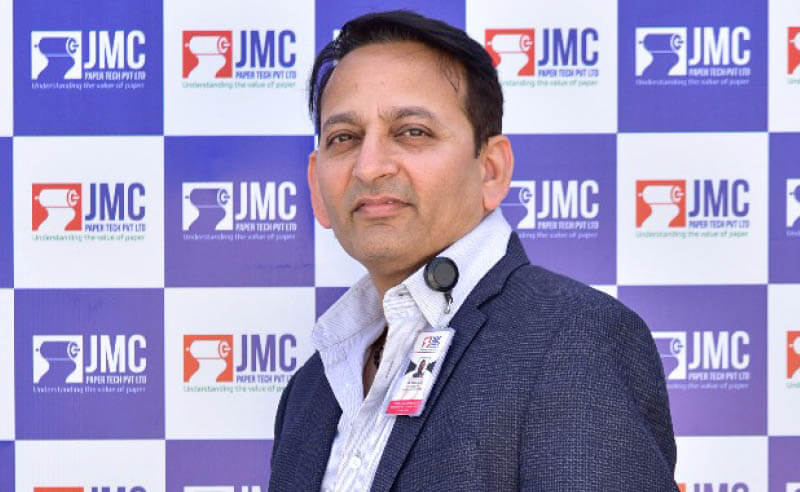“While many are claiming technologies such as automation, IoT, and data analytics are the technologies of the future, I feel that they are the present. The future is here.”

Excerpts of the interview with Mr. Rajni Patel CMD, JMC Paper Tech Pvt. Ltd.:
Paper Mart: “Atmanirbhar Bharat is not about being self-contained or closed to the world; it is about being self-sustaining, self-generating,” PM said with the message that India is walking the path of self-reliance. How do you relate the relevance of this viewpoint for the Indian pulp and paper industry?
Rajni Patel: I firmly believe that it is the perfect timing for such a motivating initiative. In the context of the pulp and paper industry, I am certain that such an initiative can do wonders. Many studies have shown the potential of growth in the Indian subcontinent when it comes to paper products and how it could also be at par with the western economies. Further, we have the perfect blend of opportunities at hand as technology is becoming omnipresent across industries and our young and dynamic workforce is renowned for its tech capabilities. Such a blend will bring us unprecedented opportunities and help us deliver world-class products rife with innovation to countries all over the world.
“A sustainable, tech-driven pulp and paper industry that is run by young and dynamic professionals will ensure its long-term development capable of supplying quality products to the entire world!”
PM: What do you think are the different strategies and the kind of investment which is required to develop a globally competitive domestic supply chain in the Indian paper industry?
RP: In today’s day and age, when many are focusing on increasing their technical capabilities, I believe that it is equally important to invest in the right talents who are capable of leveraging futuristic technological trends to develop a globally competitive supply chain in the Indian paper industry. I am certain that we need to find the right balance between both human-centric and capacity-building infrastructure. Further, as a socially responsible corporate, it is not only our obligation but a duty to develop infrastructure that ensures it is minimally disruptive for the environment. A sustainable, tech-driven pulp and paper industry that is run by young and dynamic professionals will ensure its long-term development capable of supplying quality products to the entire world!
PM: Please outline the recent product developments at your end and the upgrades you have introduced in the recent past at your production unit.
RP: I am personally following our PM Shri Narendra Modi on various platforms and we are also following the initiatives like ‘Atmanirbhar Bharat’ and ‘Vocal for Local’. We are looking forward for the best alternatives/options for these imported materials, which will greatly help us in providing the best qualitative products with lower cost. In the same manner, JMC had developed a Pressurized headbox and steel dryer cylinder with optional internal machining and grooving. Generally, these products are imported from China. However, JMC can offer the best in-house manufactured products, which will give the best performance for which it is designed. In this way, JMC manufactured products will help to lower the import in the current market. It will be beneficial in terms of a long delivery period, easy availability and lower the overall product cost, accessible post sales and services for the same.
PM: Smart manufacturing together with Industry 4.0 is emerging as the next step towards calibrating manufacturing for the future. What are your strategies and outlook on this technology-driven approach to monitoring and improve manufacturing performance in the paper industry?
RP: While many are claiming technologies such as automation, Internet of Things, and data analytics are the technologies of the future, I feel that they are the present. The future is here. The faster we adopt these technologies, the faster we will be able to unlock unprecedented operational efficiencies and production levels. It is crucial that we, as a country, develop a versatile workforce that is capable of learning such technologies while retaining a conceptual grasp of engineering as we need to find a fine balance between the two verticals. At JMC, we are always looking to include innovation in our product development efforts as we believe that such technological interventions will not only help us increase our production capacities, but also optimize our existing infrastructure, leading to a two-pronged improvement in our operations.
“We need to find the right balance between both human-centric and capacity-building infrastructure.”
PM: Modernization of the entire industry will require a huge investment to bring improvement in core competencies such as including a quantifiable increase in productivity, and quality improvement. What kind of trends do you foresee with respect to capacity expansions, quality enhancement, productivity improvements in the sector?
RP: I think the trends that we will witness will be comprehensive. While technical know-how of these new-age technologies seems like a luxury at present, tomorrow, it will be a necessity. We need to invest in industry-specific education that will yield more prepared individuals who can take the pulp and paper industry forward. As far as the manufacturers of this industry are concerned, it is important that we no longer resist technology and instead, upgrade our existing systems to leverage its benefits. Automation will help increase productivity and data analytics will herald an unprecedented age of meaningful information, leading to an increase in performance levels. Such technologies will help us take giant strides towards becoming a leading supplier of paper and pulp industry products across the world.



